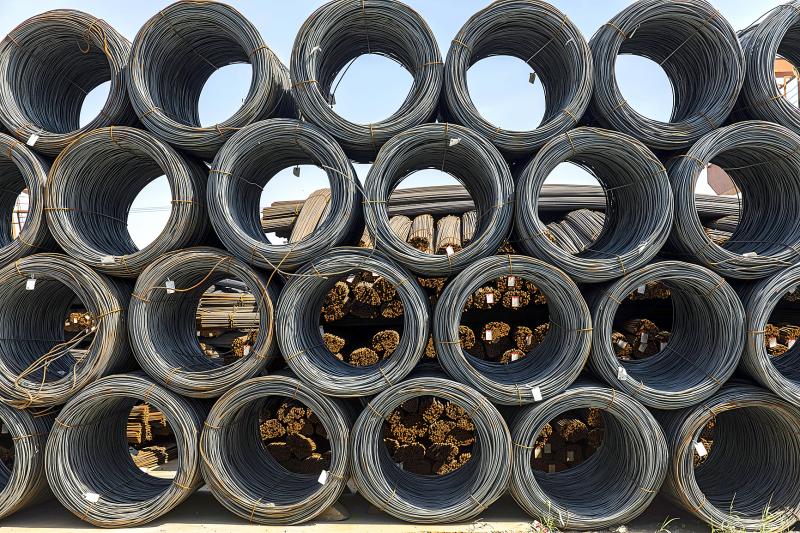China Steel Corp (中鋼), the nation’s biggest steelmaker, yesterday said that it would not be raising prices for some products next month, ending 12 consecutive months of increases.
“There is a discrepancy between China Steel’s prices and international prices, but in consideration of price stability, we have decided not to adjust upward monthly-priced products,” the company said in a statement.
That means the price of hot-rolled steel plates, hot-rolled steel coils, cold-rolled steel coils and other monthly-priced items would not change next month.

Photo: Qilai Shen, Bloomberg
However, the cost of other items priced seasonally would be going up, the company said, adding that prices of products would be raised by 4.1 percent on average.
Prices of steel plates for the shipping industry would be raised by NT$2,000 per tonne, while prices of high-carbon hot-rolled steel plates, automotive steel, cold-rolled coils and hot-rolled coils would be raised by NT$2,900 per tonne, the company said.
“The accumulated gains in the global market for seasonal products demanded a reasonable adjustment to bring domestic prices closer to global market prices,” China Steel said.
Given the severe shortage of materials downstream consumers are experiencing, the company announced that it would “allow the appropriate imports of steel materials to solve the shortage.”
The statement also said that climate change and carbon taxes are becoming a global trend, and domestic buyers should take carbon neutrality costs into account going forward.
“Starting from next year, China Steel plans to add environmental costs such as carbon fees to our export orders,” the statement said. “The steel industry must respond to the global trend to decarbonize and calculate the carbon footprint of its products.”
“China Steel suggests that downstream companies prepare for the changes that are to come,” it added.

STIMULUS PLANS: An official said that China would increase funding from special treasury bonds and expand another program focused on key strategic sectors China is to sharply increase funding from ultra-long treasury bonds this year to spur business investment and consumer-boosting initiatives, a state planner official told a news conference yesterday, as Beijing cranks up fiscal stimulus to revitalize its faltering economy. Special treasury bonds would be used to fund large-scale equipment upgrades and consumer goods trade-ins, said Yuan Da (袁達), deputy secretary-general of the Chinese National Development and Reform Commission. “The size of ultra-long special government bond funds will be sharply increased this year to intensify and expand the implementation of the two new initiatives,” Yuan said. Under the program launched last year, consumers can

Citigroup Inc and Bank of America Corp said they are leaving a global climate-banking group, becoming the latest Wall Street lenders to exit the coalition in the past month. In a statement, Citigroup said while it remains committed to achieving net zero emissions, it is exiting the Net-Zero Banking Alliance (NZBA). Bank of America said separately on Tuesday that it is also leaving NZBA, adding that it would continue to work with clients on reducing greenhouse gas emissions. The banks’ departure from NZBA follows Goldman Sachs Group Inc and Wells Fargo & Co. The largest US financial institutions are under increasing pressure

TRENDS: The bitcoin rally sparked by US president-elect Donald Trump’s victory has slowed down, partly due to outflows from exchange-traded funds for the token Gold is heading for one of its biggest annual gains this century, with a 27 percent advance that has been fueled by US monetary easing, sustained geopolitical risks and a wave of purchases by central banks. While bullion has ticked lower since US president-elect Donald Trump’s sweeping victory in last month’s election, its gains this year still outstrip most other commodities. Base metals have had a mixed year, while iron ore has tumbled, and lithium’s woes have deepened. The varied performances highlight the absence of a single, over-riding driver that has steered the complex’s fortunes, while also putting the spotlight

Twenty years after he was a young, struggling actor in Toronto, Thomas Lo (盧瑞麟) is now the one giving young Asian actors their big breaks. He just had to go to Hong Kong to do it. The Chinese Canadian has been the creative director of one of the territory’s biggest TV broadcasting companies for only a few years, but is already making original English-language content to reach viewers around the world. “It was a bit of a full-circle moment for me,” Lo said. “You see more Asians, but you’re still seeing the same Asians on screen, right? We’re looking for more opportunities